[Click on BLUE links for sources and more information]
This is the twelfth post of poems and napkin art at Think in the Morning. I hope you readers enjoy these as much as we do. The butterscotch pie at Tre Piatti restaurant in Puerto Vallarta is pure poetry in its own right. Bravo to Natalie, dessert artist ! You can read our post on Tre Piatti HERE.
Life is Fine
Langston Hughes
I went down to the river,
I set down on the bank.
I tried to think but couldn’t,
So I jumped in and sank.
I came up once and hollered!
I came up twice and cried!
If that water hadn’t a-been so cold
I might’ve sunk and died.
But it was Cold in that water! It was cold!
I took the elevator
Sixteen floors above the ground.
I thought about my baby
And thought I would jump down.
I stood there and I hollered!
I stood there and I cried!
If it hadn’t a-been so high
I might’ve jumped and died.
But it was High up there! It was high!
So since I’m still here livin’,
I guess I will live on.
I could’ve died for love—
But for livin’ I was born
Though you may hear me holler,
And you may see me cry—
I’ll be dogged, sweet baby,
If you gonna see me die.
Life is fine! Fine as wine! Life is fine!
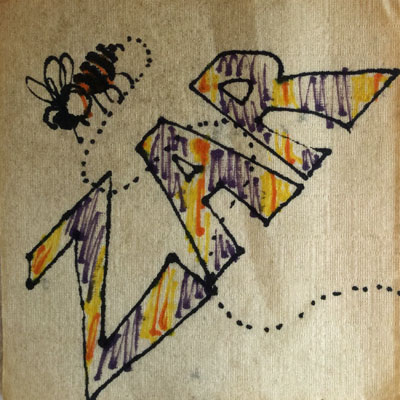
Sea Gull Cellar Bar Napkin Art, artist unknown
The Horses
Ted Hughes
I climbed through woods in the hour-before-dawn dark.
Evil air, a frost-making stillness,
Not a leaf, not a bird-
A world cast in frost. I came out above the wood
Where my breath left tortuous statues in the iron light.
But the valleys were draining the darkness
Till the moorline blackening dregs of the brightening grey
Halved the sky ahead. And I saw the horses:
Huge in the dense grey ten together
Megalith-still. They breathed, making no move,
With draped manes and tilted hind-hooves,
Making no sound.
I passed: not one snorted or jerked its head.
Grey silent fragments
Of a grey still world.
I listened in emptiness on the moor-ridge.
The curlews tear turned its edge on the silence.
Slowly detail leafed from the darkness. Then the sun
Orange, red, red erupted
Silently, and splitting to its core tore and flung cloud,
Shook the gulf open, showed blue,
And the big planets hanging
I turned
Stumbling in a fever of a dream, down towards
The dark woods, from the kindling tops,
And came the horses.
There, still they stood,
But now steaming, and glistening under the flow of light,
Their draped stone manes, their tilted hind-hooves
Stirring under a thaw while all around them
The frost showed its fires. But still they made no sound.
Not one snorted or stamped,
Their hung heads patient as the horizons,
High over valleys, in the red levelling rays
In din of the crowded streets, going among the years, the faces,
May I still meet my memory in so lonely a place
Between the streams and the red clouds, hearing curlews,
Hearing the horizons endure.
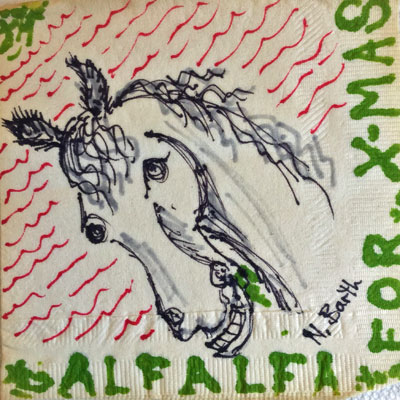
Sea Gull Cellar Bar Napkin Art, Nancy Barth artist
The Button-Down Life
— h.j.s.
I can’t live the button-down life like you.
I want it all:
the terrifying lows
the dizzying highs
the creamy middles
Sure — I might offend a few of the bluenoses
with my cocky stride
and musky odors
O — I’ll never be the darling of the so-called City-Fathers
who cluck their tongues
stroke their beards
and talk about
“What’s to be done with this Homer Simpson?”
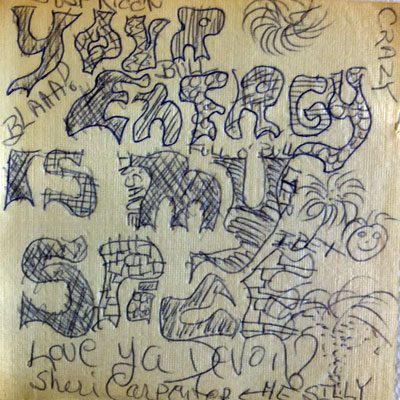
Sea Gull Cellar Bar Napkin Art, artist unknown
Find h.j.s. poems here: https://hjsuter.wordpress.com
A Psalm of Life
Henry Wadsworth Longfellow
What the heart of the young man said to the Psalmist
Tell me not, in mournful numbers,
Life is but an empty dream!
For the soul is dead that slumbers,
And things are not what they seem.
Life is real! Life is earnest!
And the grave is not its goal;
Dust thou art, to dust returnest,
Was not spoken of the soul.
Not enjoyment, and not sorrow,
Is our destined end or way;
But to act, that each tomorrow
Find us farther than today.
Art is long, and Time is fleeting,
And our hearts, though stout and brave,
Still, like muffled drums, are beating
Funeral marches to the grave.
In the world’s broad field of battle,
In the bivouac of Life,
Be not like dumb, driven cattle!
Be a hero in the strife!
Trust no Future, howe’er pleasant!
Let the dead Past bury its dead!
Act,—act in the living Present!
Heart within, and God o’erhead!
Lives of great men all remind us
We can make our lives sublime,
And, departing, leave behind us
Footprints on the sands of time;—
Footprints, that perhaps another,
Sailing o’er life’s solemn main,
A forlorn and shipwrecked brother,
Seeing, shall take heart again.
Let us, then, be up and doing,
With a heart for any fate;
Still achieving, still pursuing,
Learn to labor and to wait.
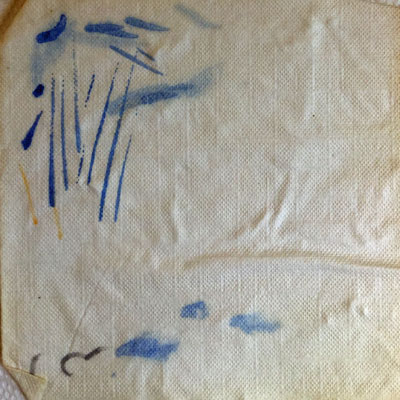
Sea Gull Cellar Bar Napkin Art, artist unknown
Song to Amarantha, that she would Dishevel her Hair
Richard Lovelace
Amarantha sweet and fair
Ah braid no more that shining hair! As my curious hand or eye Hovering round thee let it fly.
Let it fly as unconfin’d
As its calm ravisher, the wind,
Who hath left his darling th’East,
To wanton o’er that spicy nest.
Ev’ry tress must be confest
But neatly tangled at the best;
Like a clue of golden thread,
Most excellently ravelled.
Do not then wind up that light
In ribands, and o’er-cloud in night;
Like the sun in’s early ray,
But shake your head and scatter day.
See ’tis broke! Within this grove
The bower, and the walks of love,
Weary lie we down and rest,
And fan each other’s panting breast.
Here we’ll strip and cool our fire
In cream below, in milk-baths higher:
And when all wells are drawn dry,
I’ll drink a tear out of thine eye,
Which our very joys shall leave
That sorrows thus we can deceive;
Or our very sorrows weep,
That joys so ripe, so little keep.
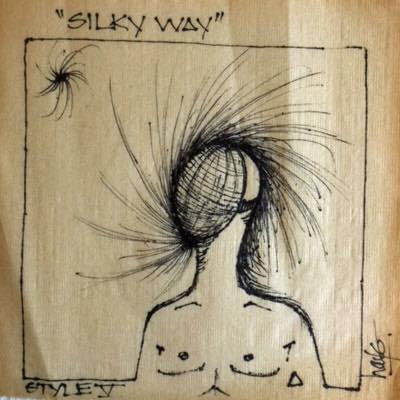
Sea Gull Cellar Bar Napkin Art, Jack Haye artist
Buffalo Soldier
Bob Marley
Buffalo Soldier, dreadlock Rasta
There was a Buffalo Soldier
In the heart of America
Stolen from Africa, brought to America
Fighting on arrival, fighting for survival
I mean it, when I analyze these things
To me, it makes a lot of sense
How the dreadlock Rasta was the Buffalo Soldier
And he was taken from Africa, brought to America
Fighting on arrival, fighting for survival
Said he was a Buffalo Soldier, dreadlock Rasta
Buffalo Soldier, in the heart of America
If you know your history
Then you would know where you coming from
Then you wouldn’t have to ask me
Who the heck do I think I am
I’m just a Buffalo Soldier
In the heart of America
Stolen from Africa, brought to America
Said he was fighting on arrival
Fighting for survival
Said he was a Buffalo Soldier
Win the war for America
Said he was a, woe yoy yoy, woe woe yoy yoy
Woe yoy yoy yo, yo yo woy yo, woe yoy yoy
Woe yoe yoe, woe woe yoe yoe
Woe yoe yoe yo, yo yo woe yo woe yo yoe
Buffalo Soldier, troddin’ through the land woo ooh
Said he wanna ran, then you wanna hand
Troddin’ through the land, yea, yea
Said he was a Buffalo Soldier
Win the war for America
Buffalo Soldier, dreadlock Rasta
Fighting on arrival, fighting for survival
Driven from the mainland
To the heart of the Caribbean
Singing, woe yoy yoy, woe woe yoy yoy
Woe yoy yoy yo, yo yo woy yo woy yo yoy
Woy yoy yoy, woy woy yoy yoy
Woy yoy yoy yo, yo yo woe yo woe yo yoy
Troddin’ through San Juan
In the arms of America
Troddin’ through Jamaica, a Buffalo Soldier
Fighting on arrival, fighting for survival
Buffalo Soldier, dreadlock Rasta
Woe yoe yoe, woe woe yoe yoe
Woe yoe yeo yo, yo yo woe yo woe yo
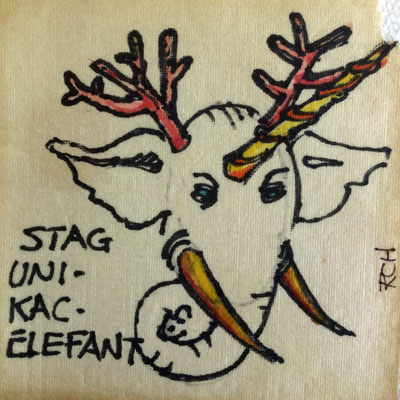
Sea Gull Cellar Bar Napkin Art, Roy Hoggard artist
Ricardo Pau-Llosa
Ganaderia (Cattle Raising)
Stories have it that when the rebels
descended on Camaguey province they ordered
the cattle slaughtered to feed the campesinos.
Neither the industry nor the cattle ever recovered.
The guerilla leaders were educated men,
how could they not know you don’t eat breeding stock?
Two decades later Fidel is in love with a cow,
Ubre Blanca (White Udder). Before the cameras
he explains each step of his gloved penetration,
bull semen dripping from his fist. Gently he lifts
Ubre Blanca’s tail after reassuring her
with a stroke on the rump. The foreman sinks
into the cow slowly and his face announces
the moment he opens his fist inside her.
One day the record breaking milk mother died
and a distraught Fidel ordered a monument be built
to White Udder, the revolutionary cow.
Fidel’s parents finally married to get him
into the Jesuit school in Oriente. The bovine
mother, the stern father, illegitimate Edmund
pulling a revolver against his rival’s head
in a café, the autonomous University his hideout.
He married the convenient daughter of a batistiano,
In exile former classmates will talk of his brutality,
but none opposed him when he descended from the Sierra.
They were educated men, how could they not know
what was coming? How could they not save Ubre Blanca
from the endless speeches, the cameras, and the fist?

Sea Gull Cellar Bar Napkin Art, Jack Haye artist
Point of View
a.a.
Every day
When you’re walking
Down the street,
Everybody
That you meet,
Has an original
Point of view
And I say HEY! (Hey!)
What a wonderful kind of day!
Where you can learn to work and play
And get along with each other.
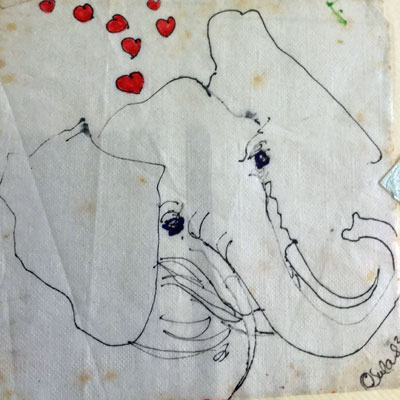
Sea Gull Cellar Bar Napkin Art, Sula artist
An Upper Chamber in a Darkened House
Frederick Tuckerman
An upper chamber in a darkened house,
Where, ere his footsteps reached ripe manhood’s brink,
Terror and anguish were his cup to drink, –
I cannot rid the thought, nor hold it close;
But dimly dream upon that man alone; –
Now though the autumn clouds most softly pass;
The cricket chides beneath the doorstep stone,
And greener than the season grows the grass.
Nor can I drop my lids, nor shade my brows,
But there he stands beside the lifted sash;
And, with a swooning of the heart,
I think where the black shingles slope to meet the boughs,
And – shattered on the roof like smallest snows –
The tiny petals of the mountain-ash.
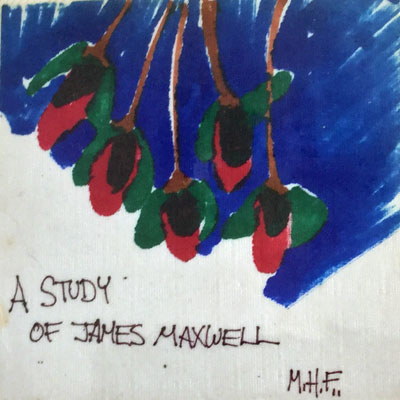
Sea Gull Cellar Bar Napkin Art, M.H.F. artist
Final Notations
Adrienne Rich
it will not be simple, it will not be long
it will take little time, it will take all your thought
it will take all your heart, it will take all your breath
it will be short, it will not be simple
it will touch through your ribs, it will take all your heart
it will not be long, it will occupy your thought
as a city is occupied, as a bed is occupied
it will take all your flesh, it will not be simple
You are coming into us who cannot withstand you
you are coming into us who never wanted to withstand you
you are taking parts of us into places never planned
you are going far away with pieces of our lives
it will be short, it will take all your breath
it will not be simple, it will become your will
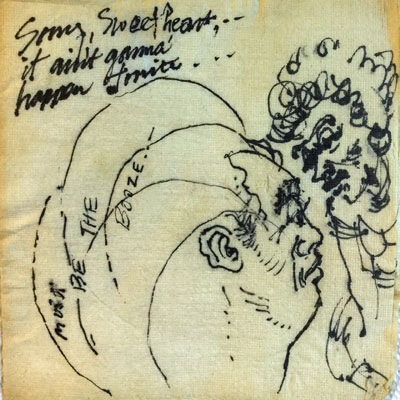
Sea Gull Cellar Bar Napkin Art, artist unknown
“A Ghost, a Real Ghost”
Randall Jarrell
“I think of that old woman in the song
Who could not know herself without the skirt
They cut off while she slept beside a stile.
Her dog jumped at the unaccustomed legs
And barked till she turned slowly from her gate
And went – I never asked them where she went.
The child is hopeful and unhappy in a world
Whose future is his recourse: she kept walking
Until the skirt grew, cleared her head and dog –
Surely I thought so when I laughed. If skirts don’t grow,
If things can happen so, and you not know
What you could do, why, what is there you could do?
I know now she went nowhere; went to wait
In the bare night of the fields, to whisper:
“I’ll sit and wish that it was never so.”
I see her sitting on the ground and wishing,
The wind jumps like a dog against her legs,
And she keeps thinking: “This is all a dream.”
“Who would cut off a poor old woman’s skirt?
So good too. No, it’s not so:
No one could feel so, really.” And yet one might.
A ghost must; and she was, perhaps, a ghost.
The first night I looked into the mirror
And saw the room empty, I could not believe
That it was possible to keep existing
In such pain: I have existed.
Was the old woman dead? What does it matter?
– Am I dead? A ghost, a real ghost
Has no need to die: what is he except
A being without access to the universe
That he has not yet managed to forget?”
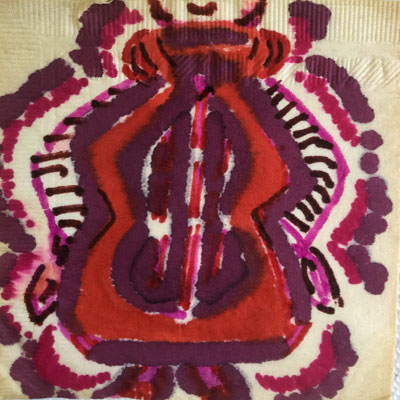
Sea Gull Cellar Bar Napkin Art, Estelle Grunewald artist
Poetry
Marianne Moore
I, too, dislike it: there are things that are important beyond all
this fiddle.
Reading it, however, with a perfect contempt for it, one
discovers in
it after all, a place for the genuine.
Hands that can grasp, eyes
that can dilate, hair that can rise
if it must, these things are important not because a
high-sounding interpretation can be put upon them but because
they are
useful. When they become so derivative as to become
unintelligible,
the same thing may be said for all of us, that we
do not admire what
we cannot understand: the bat
holding on upside down or in quest of something to
eat, elephants pushing, a wild horse taking a roll, a tireless wolf
under
a tree, the immovable critic twitching his skin like a horse that
feels a
flea, the base-
ball fan, the statistician–
nor is it valid
to discriminate against ‘business documents and
school-books’; all these phenomena are important. One must
make a distinction
however: when dragged into prominence by half poets, the
result is not poetry,
nor till the poets among us can be
‘literalists of
the imagination’–above
insolence and triviality and can present
for inspection, ‘imaginary gardens with real toads in them’, shall
we have
it. In the meantime, if you demand on the one hand,
the raw material of poetry in
all its rawness and
that which is on the other hand
genuine, you are interested in poetry.

Sea Gull Cellar Bar Napkin Art, Cindy Swan artist

